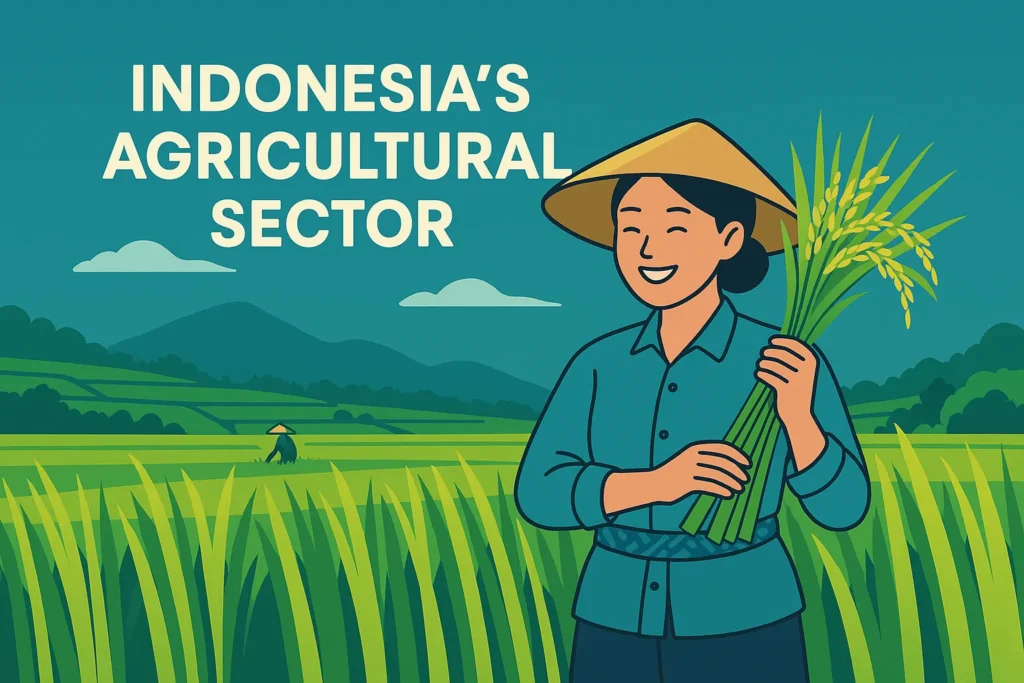Agriculture has long been the backbone of Indonesia, serving not only as the primary food source for its vast population but also as a driving force for the Economy of Indonesia and the cultural bedrock of its rural communities. From the westernmost tip of Sabang to the eastern reaches of Merauke, Indonesia’s rich and diverse agricultural landscape reflects both the strengths and challenges of this vital sector.
See Table of Contents

Diverse Commodities and Immense Potential
Blessed with fertile soils and a tropical climate, Indonesia supports the growth of an extensive range of agricultural commodities. Rice stands as the most crucial, being the staple food for the majority of its citizens. However, beyond rice, Indonesia is also a significant global producer of:
- Palm Oil: Indonesia is the world’s largest producer of palm oil, contributing substantially to its national exports and the global supply chain.
- Rubber: With a long history of rubber plantations, Indonesia consistently ranks among the top natural rubber exporters globally.
- Coffee: From the aromatic Gayo to the robust Mandailing varieties, Indonesian coffee is highly regarded in international markets.
- Cocoa: This chocolate raw material thrives in various regions, supporting both domestic processing industries and global exports.
- Spices: Cloves, nutmeg, pepper, and vanilla have captivated the world’s attention since the colonial era and remain valuable commodities today.
- Horticulture: Tropical fruits like mangoes, durians, bananas, and a wide array of vegetables offer significant potential for domestic consumption and export.
This remarkable diversity underscores Indonesia’s agricultural potential not only to meet domestic demands but also to compete robustly on the global stage.
Crucial Role in Economy and Society
The agricultural sector contributes significantly to Indonesia’s Gross Domestic Product (GDP) and absorbs a large number of workers, particularly in rural areas. This makes agriculture an anchor of economic and social stability, preventing excessive urbanization and preserving traditional livelihoods. The contribution of agriculture to Indonesia’s economic growth is undeniable, given its role in job creation and sustaining rural life.
Moreover, agriculture carries profound social and cultural dimensions. Traditional farming systems, local wisdom, and harvest cycles have shaped the identity of rural communities for centuries. Farmers are not just producers; they are also custodians of the environment and inheritors of rich traditions.
Challenges and Opportunities in the Modern Era
Despite its vast potential and crucial role, Indonesian agriculture faces several challenges:
- Climate Change: Extreme weather patterns, droughts, and floods increasingly threaten agricultural productivity.
- Land Degradation: Erosion and declining soil fertility are pressing issues.
- Land Fragmentation: Small and fragmented landholdings often hinder efficiency and large-scale modernization.
- Access to Technology and Capital: Smallholder farmers often struggle to access modern technology, adequate irrigation, and financing.
- Price Volatility: Fluctuations in global commodity prices can drastically impact farmers’ incomes.
- Farmer Regeneration: Attracting younger generations to join this economic sector remains a significant concern.
However, amidst these challenges, immense opportunities emerge:
- Adoption of Agricultural Technology (Agri-tech): Smart farming applications, drones, and IoT can significantly enhance efficiency and productivity.
- Downstreaming and Value Addition: Processing agricultural produce into higher-value processed goods reduces reliance on raw material exports.
- Sustainable Agriculture: Implementing organic, regenerative, and environmentally friendly farming practices is crucial for preserving natural resources. This concept is key to overcoming environmental challenges and ensuring the long-term sustainability of agricultural resources.
- Domestic and Global Market Expansion: Strengthening supply chains and exploring new markets for Indonesian agricultural products.
- Farmer Empowerment: Through training, access to capital, and strengthening farmer institutions.
The Future of Indonesian Agriculture: Towards Sustainable Practices
The government and various stakeholders continue to strive for strengthening the economic contribution of the agricultural sector through various policies and programs, including social forestry initiatives, agrarian reform, and the modernization of farming tools and machinery. Investment in research and development is also crucial to produce superior varieties and more efficient cultivation techniques.
A significant effort in modernizing agriculture involves the use of accurate data and information. To map Indonesia’s agricultural potential and formulate a New Roadmap for Sustainable Agriculture, the Central Bureau of Statistics (BPS) conducted the 2023 Agricultural Census (ST2023). The results of this census are compiled in the official BPS publication titled “Potensi Pertanian Indonesia: Peta Baru Pertanian Berkelanjutan” (Indonesia’s Agricultural Potential: A New Roadmap for Sustainable Agriculture).
This document, compiled by the Directorate of Statistical Analysis and Development and published by the Central Bureau of Statistics, provides a comprehensive overview of the current state and future direction of agriculture in Indonesia. This publication is an essential data source for stakeholders to make informed decisions and formulate effective policies, ensuring national food security and a significant contribution of agriculture to the future Economy of Indonesia.
Indonesian agriculture is more than just planting and harvesting. It embodies resilience, innovation, and sustainability. Through collaboration among the government, farmers, private sector, and communities, Indonesian agriculture can continue to grow as an even stronger pillar, securing national food resilience and significantly contributing to Indonesia’s economic progress in the future.
Primary Document Source:
- Title: Potensi Pertanian Indonesia: Peta Baru Pertanian Berkelanjutan (Indonesia’s Agricultural Potential: A New Roadmap for Sustainable Agriculture)
- Author/Compiler: Directorate of Statistical Analysis and Development
- Publisher: Central Bureau of Statistics (Badan Pusat Statistik – BPS), Indonesia
- Publication Number: 07300.24018
- ISBN: 978-602-438-529-3 (PDF)
- Access Publication: You can download and read the full document on the official BPS website: Potensi Pertanian Indonesia: Peta Baru Pertanian Berkelanjutan
